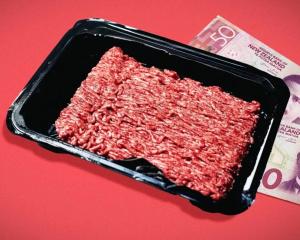
Better known for their Veehof hoof care business, Fred and Sandy Hoekstra have raised Limousin cattle, only lately starting to sell their small herd.
The Hoekstras won the best pair of prime steers title and the supreme champion exhibit at the Canterbury A&P prime cattle competition with a pair of Limousin steers. The pair just missed out on $4/kg which was achieved by a Birch Hill Ltd heifer making $4.04/kg.
Then, a few weeks later, another Limousin steer sold by the Hoekstras made $4.10/kg at the livestock sales at Canterbury Agricultural Park.
Competition co-organiser Mick Withers, a livestock representative with Rural Livestock, said the top competition winners were some of the best cattle he had seen passing through the yards until the Hoekstras’ steer topped this at the next sale.
He said the liveweight price was understood to be a record for the "priciest steer" per kilogram in the country.

"The Veehof steer was 595kg and was bought for $2440 by Salal’s Halal Butchery on Lincoln Rd. He had put a lot of weight on even over the last two weeks, because the others did not hit 600kg and this guy nearly did and he was by far the best of that line when he came in. His double muscling was hanging over his rear."
He said the Hoekstras were being rewarded for breeding top animals.
They had sold their cows with the steers coming on the market and they would be out of cattle raising once heifers were sold next year. The couple’s line of Limousins was also among the highlights in a large yarding of Canterbury’s best cattle attending the beef awards, he said.
"That culminated in them winning the supreme champion exhibit award with a pair of 2-year-old steers weighing 585 kilograms liveweight and they made $3.96/kg. So they were the best pair of steers which went on to win the overall competition."
Oxford’s Birch Hill Ltd won the best prime heifer award which set a national record at $4.04/kg at the time and also the best local trade animal with a Limousin steer.
IP Chamberlain & Company at Norwood won the best prime steer category with an Angus steer, selling for $3.99/kg, and the pair of heifers was won by Selwyn River Stud at Irwell with a pair of Limousins.
Mr Withers said Birch Hill’s best prime heifer was also bought by Salal’s Halal Butchery from Christchurch.
"Salal likes to promote his beef by saying best at the Canterbury Show, but also when he buys beef he doesn’t want any fat in it because that’s Halal kill and they want lean meat with animals yielding 60% with no fat. That’s gold to them."
He said the $4.04/kg price was equivalent to a meat schedule price of $7.20/kg when the schedule was running at the time at $6.80/kg.
"They were in demand because of the yield that they were going to produce and the finish on them. They were extremely well-finished cattle without having fat on them and just meat. We got to about $3.85/kg or $3.90/kg about three or four weeks before then and then it started to come back and I thought, hello, we had peaked, and then look what happened."

The schedule lifted in mid-November despite large yardings. This likely reflected earlier animals sold during the Canterbury drought and unfinished cattle offloaded during a poor start to spring which would normally be seen now, he said.
Mr Withers said the New Zealand Young Auctioneers Competition coinciding during the prime cattle competition also had an impact with buyers encouraging them by lifting bids.
He said the lineup of nine young auctioneers were judged on their performance after each selling three lots during the cattle competition.
The winner was Karl Chitham from Carrfields, in Waikato, after his fourth attempt. Among the prize pool was a trip to Australia to show his skills as an auctioneering exhibitor after the Australia young auctioneers competition is finished at next year’s Sydney Royal Easter Show.
Buyers included butchers, traders filling local and export orders and finishers.












